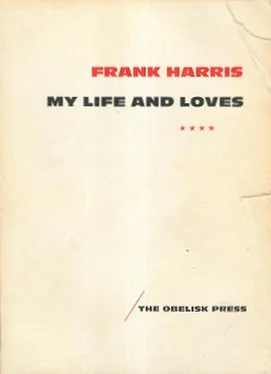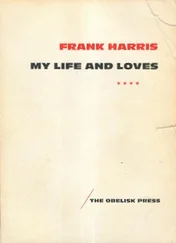Frank Harris - My Life and Loves, Book 1
Здесь есть возможность читать онлайн «Frank Harris - My Life and Loves, Book 1» весь текст электронной книги совершенно бесплатно (целиком полную версию без сокращений). В некоторых случаях можно слушать аудио, скачать через торрент в формате fb2 и присутствует краткое содержание. Жанр: Эротика, Секс, на английском языке. Описание произведения, (предисловие) а так же отзывы посетителей доступны на портале библиотеки ЛибКат.
- Название:My Life and Loves, Book 1
- Автор:
- Жанр:
- Год:неизвестен
- ISBN:нет данных
- Рейтинг книги:4 / 5. Голосов: 1
-
Избранное:Добавить в избранное
- Отзывы:
-
Ваша оценка:
- 80
- 1
- 2
- 3
- 4
- 5
My Life and Loves, Book 1: краткое содержание, описание и аннотация
Предлагаем к чтению аннотацию, описание, краткое содержание или предисловие (зависит от того, что написал сам автор книги «My Life and Loves, Book 1»). Если вы не нашли необходимую информацию о книге — напишите в комментариях, мы постараемся отыскать её.
My Life and Loves, Book 1 — читать онлайн бесплатно полную книгу (весь текст) целиком
Ниже представлен текст книги, разбитый по страницам. Система сохранения места последней прочитанной страницы, позволяет с удобством читать онлайн бесплатно книгу «My Life and Loves, Book 1», без необходимости каждый раз заново искать на чём Вы остановились. Поставьте закладку, и сможете в любой момент перейти на страницу, на которой закончили чтение.
Интервал:
Закладка:
I got to the station early one summer morning and sent my baggage by fiacre to the Hotel Meurice in the rue Rivoli, the same old hotel that Lever the novelist has praised, and then I got into a little Victoria and drove to the Place de la Bastille. The obvious cafe life of the people did not appeal to me, but when I saw the glory springing from the Column of July, tears flooded my eyes, for I recalled Carlyle's description of the taking of the prison. I paid the cocker and wandered up the rue Rivoli, past the Louvre, past the blackened walls with the sightless windows of the Tuileries palace-a regret in their desolate appeal, and so to the Place de la Greve with its memories of the guillotine and the great revolution, now merged in the Place de la Concorde. Just opposite I could distinguish the gilt dome of the Church of the Invalides where the body of Napoleon lies as he desired: «On the banks of the Seine, in the midst of that French people I have loved so passionately!» And there were the horses of Marly champing at the entrance to the Champs Elysees and at the far end of the long hill, the Arch! The words came to my lips:
Up the long dim road where thundered The army of Italy onward By the great pale arch of the Star. It was the deep historic sense of this great people that first won me, and their loving admiration of their poets and artists and guides. I can never describe the thrill it gave me to find on a small house a marble plaque recording the fact that poor De Musset had once lived there, and another on the house wherein he died. Oh, how right the French are to have a Place Malherbe, an Avenue Victor Hugo, an Avenue de la Grande Armee, too, and an Avenue de l'Imperatrice as well, though it has since been changed prosaically into the Avenue du Bois de Boulogne. From the Place de la Concorde I crossed the Seine and walked down the quays to the left and soon passed the Conciergerie and Ste. Chapelle with its gorgeous painted glass-windows of a thousand years ago; and there before me, on the lie de la Cite, the twin towers of Notre Dame caught my eyes and breath; and finally, early in the afternoon, I turned up the Boul Mich and passed the Sorbonne, and then somehow or other lost myself in the old rue St.
Jacques that Dumas pere and other romance-writers had described for me a thousand times. A little tired at length, having left the Luxembourg gardens far behind with their statues, which I promised myself soon to study more closely, I turned into a little wine shop-restaurant kept by a portly and pleasant lady, whose name, I soon learned, was Marguerite. After a most excellent meal I engaged a large room on the first floor looking on the street for forty francs a month, and if a friend should come to live with me, why, Marguerite promised, with a large smile, to put in another bed for an additional ten francs monthly, and supply us besides with coffee in the morning and whatever meals we wanted at most reasonable prices. There I lived gaudy, golden days for some three heavenly weeks. I threw myself on French like a glutton and this was my method, which I don't recommend but simply record, though it brought me to understand everything said by the end of the first week. I spent five whole days on the grammar, learning all the verbs, especially the auxiliary and irregular verbs by heart, till I knew them as I knew my alphabet. I then read Hugo's Hernani with a dictionary in another long day of eighteen hours, and the next evening went to the gallery in the Comedie Francaise to see the play acted by Sarah Bernhardt as Dona Sol and Mounet-Sully as Hernani. For a while the rapid speech and strange accent puzzled me, but after the first act I began to understand what was said on the stage, and after the second act I caught every word; and to my delight, when I came out into the streets I understood everything said to me. After that golden night with Sarah's grave trainante voice in my ears, I made rapid because unconscious progress.
Next day in the restaurant I picked up a dirty, torn copy of Madame Bovary that lacked the first eighty pages. I took it to my room and swallowed it in a couple of breathless hours, realizing at once that it was a masterwork, but marking a hundred and fifty new words to turn out in my pocket dictionary afterwards. I learned these words carefully by heart and have never given myself any trouble about French since. What I know of it, and I know it fairly well now, has come from reading and speaking it for thirty odd years. I still make mistakes in it, chiefly of gender, I regret to say, and my accent is that of a foreigner; but taking it by and large I know it and its literature, and speak it better than most foreigners, and that suffices me. After some three weeks Ned Bancroft came from the States to live with me. He was never particularly sympathetic to me and I cannot account for our companionship, save by the fact that I was peculiarly heedless and full of human, unreflecting kindness. I have said little of Ned Bancroft, who was in love with Kate Stephens before she fell for Professor Smith; but I have just recorded the unselfish way he withdrew while keeping intact his friendship both for Smith and the girl. I thought that very fine of him. He left Lawrence and the university shortly after we first met and by «pull» obtained a good position on the railroad at Columbus, Ohio. He was always writing to me to come to visit him, and on my return from Philadelphia, in 1875, I think, I stopped at Columbus and spent a couple of days with him. As soon as he heard that I had gone to Europe and had reached Paris, he wrote to me that he wished I had asked him to come with me; and so I wrote setting forth my purpose, and at once he threw up his good prospects of riches and honor and came to me in Paris. We lived together for some six months. He was a tall, strong fellow, with pale face and grey eyes; a good student, an honorable, kindly, very intelligent man; but we envisaged life from totally different sides, and the longer we were together, the less we understood each other. In everything we were antiposed; he should have been an Englishman, for he was a born aristocrat with imperious, expensive tastes, while I had really become a western American, careless of dress or food or position, intent only on acquiring knowledge and, if possible, wisdom, in order to reach greatness.
The first evening we dined at Marguerite's and spent the night talking and swapping news. The very next afternoon Ned would go into Paris and we dined in a swell restaurant on the Grand Boulevard. A few tables away a tall, splendid looking brunette of perhaps thirty was dining with two men: I saw soon that Ned and she were exchanging looks and making signs. He told me he intended to go home with her. I remonstrated, but he was as obstinate as Charlie, and when I told him of the risks, he said he'd never do it again, but this time he couldn't get out of it. «I'll pay the bill at once,» I said, «and let's go,» but he would not; desire was alight in him and a feeling of false shame hindered him from taking my advice. Half an hour later the lady made a sign and he went out with the party, and when she entered her Victoria he got in with her, the pair on the sidewalk, he said, bursting into laughter as he and the woman drove away together.
Next morning he was back with me early, only saying that he had enjoyed himself hugely and was not even afraid. Her rooms were lovely, he declared; he had to give her a hundred francs; the bath and toilette arrangements were those of a queen; there was no danger. And he treated me to as wild a theory as Charlie had cherished: told me that the great cocottes who make heaps of money took as much care of themselves as gentlemen. «Go with a common prostitute and you'll catch something; go with a real top-notcher and she's sure to be all right!»
And perfectly at ease he went to work with a will. Bancroft's way of learning French, even, was totally different from mine. He went at the grammar and syntax and mastered them; he could write excellent French at the end of four months, but spoke it very haltingly and with a ferocious American accent. When I told him I was going to hear Taine lecture on the philosophy of art and the ideal in art, he laughed at me; but I believe I got more from Taine than he got from his more exact knowledge of French. When I came to know Taine and was able to call on him and talk to him, Bancroft, too, wanted to know him. I brought them together, but clearly Taine was not impressed, for Ned out of false shame hardly opened his mouth. But I learned a good deal from Taine, and one illustration of his abides with me as giving a true and vivid conception of art and its ideal. In a lecture he pointed out to his students that a lion was not a running beast, but a great jaw set on four powerful springs of short, massive legs. The artist, he went on, seizing the idea of the animal, may exaggerate the size and strength of the jaw a little, emphasize, too, the springing power in his loins and legs and the tearing strength of his front paws and claws; but if he lengthened his legs or diminished his jaw, he would denaturalize the true idea of the beast and would produce an abortion. The ideal, however, should only be indicated. Taine's talks, too, on literature and the importance of the environment even on great men all made profound impression on me. After listening to him for some time I began to see my way up more clearly. I shall never forget, too, some of his thought inspiring words. Talking one day of the Convent of Monte Cassino, where a hundred generations of students, freed from all the sordid cares of existence, had given night and day to study and thought, and had preserved besides the priceless manuscripts of long past ages and so paved the way for a renascence of learning and thought, he added gravely: «I wonder whether science will ever do as much for her votaries as religion has done for hers: in other words, I wonder will there ever be a laic Monte Cassino!»
Читать дальшеИнтервал:
Закладка:
Похожие книги на «My Life and Loves, Book 1»
Представляем Вашему вниманию похожие книги на «My Life and Loves, Book 1» списком для выбора. Мы отобрали схожую по названию и смыслу литературу в надежде предоставить читателям больше вариантов отыскать новые, интересные, ещё непрочитанные произведения.
Обсуждение, отзывы о книге «My Life and Loves, Book 1» и просто собственные мнения читателей. Оставьте ваши комментарии, напишите, что Вы думаете о произведении, его смысле или главных героях. Укажите что конкретно понравилось, а что нет, и почему Вы так считаете.










